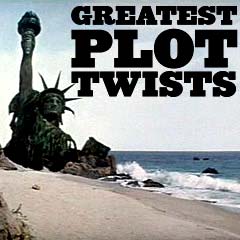
|
|
|
||||||||

|
This lurid, melodramatic film by director Joseph L. Mankiewicz was an adaptation of the 1958 Tennessee Williams play. One of its intriguing taglines was:
It was set at the Venable mansion in the French Quarter of New Orleans in the late 1930s. The three main characters were:
The doctor was urged to perform a 'brain-cutting' lobotomy on the traumatized Catherine. Catherine's tormenting illness was due to an event during the previous summer while she was traveling in Spain (in the beachside resort town of Cabeza de Lobo) for the first time with her cousin, Sebastian Venable. She had taken Mrs. Venable's place as his traveling companion, to Violet's dismay. The doting Mrs. Venable was now urging to "cut the truth" out of Catherine's brain to silence her "lies" about her son.
Mrs. Venable was using pressure tactics and bribery on Catherine's close relatives (regarding Sebastian's inheritance money) and hospital officials to have authorities commit Catherine and perform the mind-numbing operation:
Toward the film's climactic conclusion, Catherine began to describe her own account of what had happened the previous summer with her homosexual cousin. Mrs. Venable was obviously disturbed that she was no longer Sebastian's choice as a jet-setting traveling companion, because she was no longer attractive (after suffering a disfiguring stroke). Catherine bluntly told the doctor and her aunt how Sebastian had used her (and earlier Violet's) youthful and seductive beauty as a ploy or decoy. She described how both were used to lure males closer to Sebastian for his own pleasure (and for sexual favors):
Then later, she and family members gathered in the Venable garden patio's sun-room, to listen to more of Catherine's account (after taking truth serum). She again told how Sebastian had selected her to go abroad with him for the summer, to visit foreign cities such as Paris, Barcelona, and Rome. She remembered how her cousin cringed one day at her non-sexual touch:
An aspiring poet, Sebastian was suffering from writer's block, and his notebook's pages had gone blank. Catherine's lengthy account was illustrated by impressionistic flashbacks when she started talking about her recollections at the beach. Catherine became embarrassed when he dragged her into the water in order to attract attention ("I was procuring for him") - when her white one-piece bathing suit that he had bought for her became transparent:
Then, after their excursions to the beach stopped, there was another horrifying surreal incident on a very hot summer day. With an increasingly hysterical tone, she told how a sickly, fevered Sebastian was wearing a white silk suit, a white tie, and a white Panama on a blazing white afternoon. At their outdoor restaurant table, Sebastian was popping pills for his heart condition. Ravenous beggar boys ("hungry young people" making "gobbling noises with frightful grins") called out for "Pan, Pan" (bread), but were held back by a wire fence. They were loudly playing percussion instruments, drums and cymbals made with tin cans as they crowded around. It was hinted that these were boys that Sebastian knew - that he had earlier exploited - and now they were seeking revenge. When the terrified Sebastian fled from the restaurant, the band of noisy kids gave chase and pursued and surrounded him. They followed him as he ran up a steep and hilly set of streets - gripping his chest with "palpatations." Catherine had suggested going the other direction to the harbor, but he decided otherwise. She watched as the gang of boys raced after him up the narrow rocky streets as he tried to escape ("the only way was straight up"). At the summit where there were the stone ruins of an ancient temple, the male youths overtook Sebastian, and literally tore him apart and devoured him during a cannibalistic homicidal attack. She watched his body being ravaged by the angry young boys. Catherine heard him scream as his outstretched hand was grabbed, and she screamed in unison with him:
After listening to the gut-wrenching tale that was surely the truth, Violet Venable became mad and delusional (believing the doctor was her dead son) and suffered a nervous breakdown (she was unable to accept the truth about her son and his death). Crazed, she told Dr. Cukrowicz as he led her to her elevator lift - and kissed him:
By the film's end, Catherine was not going to be institutionalized or lobotomized. Catherine (referring to herself in the third person) told Dr. Cukrowicz that she had returned to a less painful present - and was now recovered:
|
 Dr. Cukrowicz (Montgomery Clift)  Catherine Holly (Elizabeth Taylor) 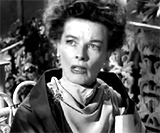 Mrs. Violet Venable (Katharine Hepburn)    The Sun-Room Scene - Catherine's Account Told     The White Bathing Suit Incident     The Ravenous Boys with Percussion Instruments - And the Deadly Chase Up the Hill  The Crazed and Delusional Mrs. Venable  Catherine - Cured |
||||||

|
Sunset Boulevard (1950) (aka Sunset Blvd.)
This classic, dark film noir about Tinseltown was director Billy Wilder's gothic masterpiece. It was a dark, film-noir story about "behind the scenes" Hollywood, self-deceit, spiritual and spatial emptiness, and the price of fame, greed, narcissism, and ambition. It opened with a shocking twist beginning - a view of the posthumous, disembodied narrator, down-on-his-luck B-movie hack screenwriter Joe Gillis (William Holden), who was sent to his doom and spoke beyond the grave (in voice-over) as a dead man corpse floating face-down in a swimming pool in Beverly Hills.
He recounted in flashback (with cynicism) about a six-month period during which he struggled to produce screenplays to meet the demands of the industry and satisfy the thirsty illusions of immortality and comeback of aging, waspish, megalomaniacal ex-silent film star queen Norma Desmond (Gloria Swanson) in her decaying Sunset Boulevard mansion. After being showered with bribes (clothes, money, flattery and other gifts), he was quickly spoiled and ensnared in her web of delusion - and death trap. Inevitably, the jealous and delusional Norma retaliated against "kept man" Joe when he again threatened to leave. She became jealous of his associations with young screenwriter Betty Schaefer (Nancy Olson) when Joe threatened to leave her. She cried out madly: "I can't face life without you, and you know I'm not afraid to die" - but then shot him as he packed up and walked away toward the outdoor pool. The film ended with police arriving after the murder, to retrieve his corpse from the pool. News cameras were rolling in the estate as Norma Desmond. The crazed and deluded woman was persuaded and coaxed to quietly come downstairs to a waiting car through a group of assembled reporters and cameramen - to surrender.
She was fooled when made to think that she was experiencing her longed-for return and shooting a Salome film scene for famous movie director Cecil B. De Mille. Disoriented, she spoke the film's final words after she had regally descended her staircase and delusionally announced:
|
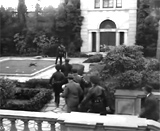   Joe Gillis (William Holden) Dead in Swimming Pool  Joe Gillis - Hack Screenwriter  Norma (Gloria Swanson): "I am big - it's the pictures that got small"  "Kept Man" Joe with Norma  Joe Gillis With Betty (Nancy Olson) |
||||||

|
In director Richard Lester's sequel to the original superhero film, Superman (Christopher Reeve) faced three superpowerful, ruthless Kryptonite criminals from his home planet:
The trio were freakishly freed from their imprisoning Phantom Zone, in the film's opening twist. (When Superman hurled a hydrogen bomb planted by terrorists in Paris' Eiffel Tower into outer space, it exploded and the shock waves released them.) By the film's finale, the Man of Steel was up against the trio in his own Arctic Fortress of Solitude, where lover/girlfriend Lois Lane (Margot Kidder) was held as their hostage/bargaining chip. Criminal mastermind Lex Luthor (Gene Hackman) activated the Kryptonite molecular chamber into which Superman was forced to enter. [Earlier in the film, Superman had voluntarily decided to enter the chamber and lose his powers to become mortal (in an irreversible process) so that he could be with Lois.] However, this time, the lights in the entire interior of the Fortress turned red (Kryptonian sunlight), not inside the chamber. [Superman had cleverly reconfigured the machine before they arrived to reverse its effects, knowing that Luthor would betray him, so that anything outside the chamber would lose its powers when the machine was activated.] Superman appeared to writhe in agony in the chamber, and then emerged humiliated, to disgrace himself and kneel before Zod to "swear eternal loyalty." He took Zod's hand - and then crushed the bones in it - and hurled the helpless Zod through the air into a far wall to his doom. The other two also fell to their deaths in the crevasse depths of the Fortress. |
 Superman Becoming Mortal   Superman Tricking Villains |
||||||

|
A second twist occurred toward the very end of the film. Fellow Daily Planet reporter Lois Lane (Margot Kidder) had discovered Clark Kent's alter-ego as Superman (Christopher Reeve), and he had decided that she would be his perfect mate and lover. To become mortal, he underwent the irreversible process of entering a crystal molecular chamber where the rays of the red sun of Krypton had been stored and harnessed. After exposing himself to those rays -- all of his great powers on Earth disappeared forever. The trade-off was that he was sleeping with Lois. Afterwards, Superman was dismayed by his physical limitations in the face of Earth's conquest by three Kryptonite criminals. Clark's opportune discovery of a glowing green crystal in his Fortress of Solitude miraculously restored his superpowers - this was a major plot twist that remained unexplained in the film. However, he and Lois had to face the difficult decision about what to do regarding their relationship. In her office, Clark listened as Lois admitted her selfishness in love when it came to him: "And I'm jealous of the whole world." She described the pain she felt about keeping his identity a secret. Lois told him he would be a "tough act to follow" if she had to find someone else. When he kissed her to reassure her of his love, it somehow erased her memory of her past few days with him as Superman. It was another ingenious, unexplained plot twist. This allowed her to function without that painful knowledge, and to keep his identity secret and safe so that he could continue to dutifully protect Earth. |
  
|
||||||
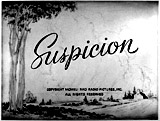
|
Suspicion (1941)
In this Hitchcock suspense thriller, prim and mousy wallflower Lina McLaidlaw (Joan Fontaine) had always been suspicious of her charming, wolfish and handsome husband Johnnie Aysgarth (Cary Grant), especially after the mysterious sudden death of Beaky Thwaite (Nigel Bruce) and the fact that Johnnie had made inquiries about borrowing against her own life insurance policy. When he brought Lina a glass of milk up a dark staircase in the film's most famous scene, she thought it was laced with a lethal dose of poison. Johnnie created financial difficulties for himself in an embezzlement scheme, and she feared, with mounting tension as the film progressed, that he had plans to do away with her to collect an insurance payoff. A wild, high-speed ride along a coastal cliffside with Johnnie driving made her fear that he was going to push her out of the vehicle when the car door swung open. In the end (one of many alternative conclusions that were considered for the film by the studio), it was revealed that Johnnie was not a homicidal killer, but that he had contemplated suicide by poisoning himself because of his mounting debts that he was unable to pay. Lina asked:
He admitted his financial difficulties to her and his ill-fated attempts to straighten things out, and ultimately his decision to face prison: ("But I saw that was a cheap way out. I'm going to see it through, prison term and everything...I can't pay it back....I tried to borrow on your insurance, but it didn't work"). Lina apologized:
She promised: "But it will be different now. We'll make it different" and successfully pleaded with him to return home with her to work things out: "Let's turn back. Johnnie, let's go home and see it all through together...It will work, I know it will, Johnnie, please!" In the scene's final moment, he made a U-turn with the car and placed his arm around her. |
 The Glass of Milk Brought Up Stairs  The Terrifying Cliffside Car Ride  Clarifications 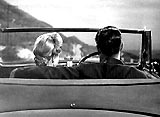 Returning Home Together |
||||||

|
Swimming Pool (2003, Fr./UK)
The events of this psychological thriller were revealed to be the inventive figment of repressed and uptight British mystery author Sarah Morton's (Charlotte Rampling) literary imagination while writing a novel called "Swimming pool." The entire movie WAS the story that she was in the midst of writing as she experienced writer's block. Her artistic juices were rejuvenated by the sexy (imagined and fictional?) character of promiscuous Julie (Ludivine Sagnier) - her London publisher John Bosload's (Charles Dance) French-born, fearless, hedonistic daughter at a southern France villa. The events around the pool were blended with her wildly experimental imaginings during the process of creating a story - possibly reflecting writer's revenge against her disinterested publisher. Twisted inspirations included an impulsive poolside murder of the local waiter by Julie bashing him in the head with a large boulder (after having sex with him) and then by having Sarah and Julie bury his body in the yard. The clinching surprise was revealed at film's end when Sarah was introduced in her publisher's office to the 'real' daughter Julia (Lauren Farrow) - a younger, shorter, chubbier-faced, braces-wearing teenager.
The pairing of the two girls in the final shots of the film confirmed that the sexy Julie was an imagined character in Sarah's mind. |
 Topless Julie (Ludivine Sagnier) by Swimming Pool 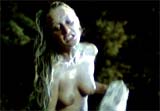 Murder Scene  Julia (Lauren Farrow) |
||||||